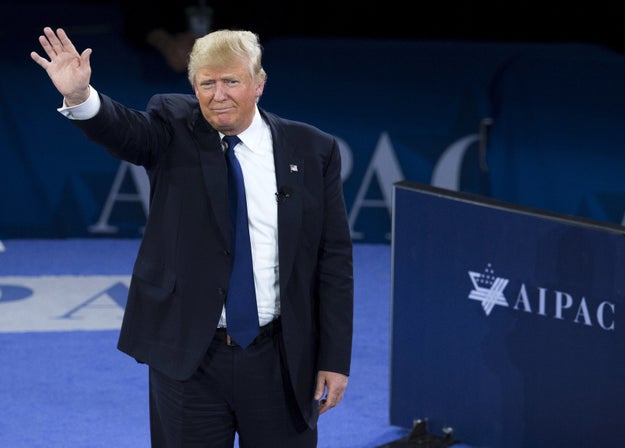[ad_1]

Saul Loeb / AFP / Getty Images
Donald Trump’s election was a vote against a certain kind of foreign policy idealism — the notions that a superpower doesn’t need to choose sides, and that diplomacy can produce “win-win” outcomes.
Trump is a zero-sum figure. His rhetoric is about winners and losers. When Obama took a step away from Israel — abstaining from a U.N. vote on settlements, and allowing his secretary of state to chide Israel — and Trump responded with the first real foreign policy move of his pre-presidency, a decisive embrace of one side of the Middle East conflict. After all, his campaign was about choosing sides.
This is probably where US politics was going anyway. Republicans have long given half-hearted support to the notion of a Palestinian state, and only because American pro-Israel groups asked them to. Obama had kept the lid on a Democratic Party shift toward a Palestinian point of view — his 2012 convention involved awkwardly ignoring a pro-Palestinian protest — but he is ending his term in angry conflict with Israel, and seems to have set a new, more straightforwardly pro-Palestinian direction for the Democratic Party.
Meanwhile, a handful of Israel’s US allies have been fighting for years for simple, unambiguous support of the Jewish State. They’ve been battling not just allies of the Palestinians but also the powerful pro-Israel lobby AIPAC, which has made bipartisan support for Israel a goal in itself. This week, I spoke to one of the leaders of that fight, Jeff Ballabon, about the end of bipartisan Israel policy.
“The partisan reality when it comes to this whole fight has been a cancer for a long time. The fact that it’s being diagnosed is a very good thing,” said Ballabon, a lawyer, lobbyist and leader among Orthodox Jews on the right, who has been waging a freelance fight against the consensus for years. Ballabon has been arguing for a vision remarkably like Trump’s at least since I profiled him in the New York Observer in 2005 after he’d raised a ton of money for George W. Bush. Since then, Ballabon has popped up in unlikely places — at religious right summits, as the spokesman for CBS News when the company decided it needed a conservative voice — and has launched a series of low-profile initiatives on Israel policy.
John Kerry spent Wednesday pleading to keep the two-state dream central to US Middle East policy. The people who succeed him have been working for years to undo it. In 2011, Ballabon worked with a South Carolina legislator, Allan Clemons, to remove support for a Palestinian state from the Republican Party platform. He blamed AIPAC for its failure, and spent the last four years pushing some AIPAC donors to demand the group stay out of that particular fray. This summer, working under the rubric of the “Iron Dome Alliance,” he and Clemons fought for similar language in the 2016 Republican Party platform. They had the backing of David Friedman, who Trump plans to make ambassador to Israel, and Trump lawyer Jason Greenblatt, who is set for another top diplomatic job. This time they won — the platform makes no reference to a two-state solution, saying only that “we oppose any measures intended to impose an agreement or to dictate borders or other terms.”

Jewish supporters of US republican presidential candidate Donald Trump hold placards in Hebrew in Jerusalem
Thomas Coex / AFP / Getty Images
Ballabon’s view of the conflict is simple, and worth trying to understand, as it seems to reflect the assumptions underlying American policy under Trump.
“The concept of Palestinian Arab was created to exist only in opposition to Israel and with them it’s always been a zero-sum game,” he told me recently. “And because it’s a zero-sum game it's never really been about negotiating issues — it’s always been: ‘Somebody’s going to be ethnically cleansed and it ain’t going to be me.’”
(The Israelis, he says, have already demonstrated a willingness to deal, having “made painful territorial concessions for peace and they still can do that with countries like Egypt and Jordan.”)
There is, in this view, no space for a Palestinian state on the West Bank of the Jordan. Republicans on Capitol Hill, he said, were thrilled when the platform changed. “Thank God,” they told him, “Finally we’re done with this nonsense of trying to jam a Palestinian State into Judea and Samaria.”
At the base of this vision, a simple formula: “There’s two combatants and what’s good for one is bad for the other,” Ballabon says.
This perspective is fairly well-suited, as Trump’s critics on the right have noted, to his view of one pillar of international relations: trade. It also seems well-suited to this new age of nationalism. The anti-Semitism that infects Trump’s online legions had some wondering if he’d really back Israel, but nationalists have always identified with the cause of Zionism, itself one of the late European nationalisms. In the new pantheon of nationalist leaders — Farage and Le Pen and Trump and Modi — you could argue that Benjamin Netanyahu has a kind of seniority (just behind Putin) and offers much for the newcomers to study. You can see in Israel a model for an ethnic state, at war with its Muslim neighbors, and yet prosperous and modern.
This is also a glimpse at what happens when the center does not hold. In this case, many on both sides the long argument over Israel and Palestine would tell you that the center is a fantasy. A “one state solution” has been gathering momentum for years among Palestinian advocates, who propose replacing Zionism with a federal, binational state. Belgium in the Levant! Ballabon’s and Friedman’s position, which seems to be Trump’s, is a different kind of one state solution. The state is Israel.
In a United States where partisanship seems to shape policy views (ie, climate) rather than vice versa, it’s easy to see where this heads. There are two warring tribes. Each party supports one. Israel becomes a Republican cause, while Democrats align with the Palestinians. U.S. elections could carry even larger stakes for both sides than they have before.
In the old days, Ballabon said, if you rejected the very notion of a Palestinian state “they would look at you as a fanatic or as you’re crazy.”
The watershed, he says, was the platform fight.
“In that one moment the entire conversation shifts. Now you have to justify the notion of a two state solution,” he said. “Everything changed in that moment.”
[ad_2]
